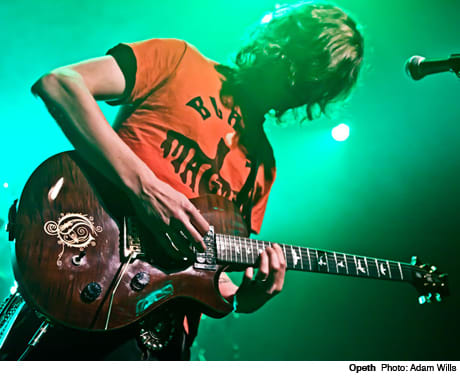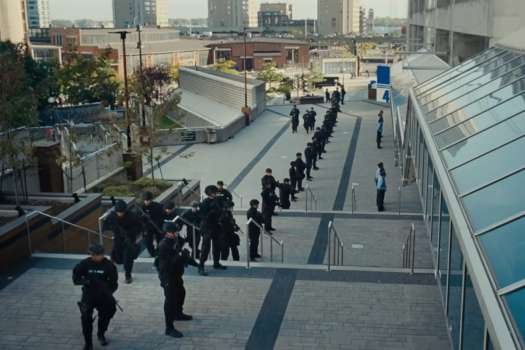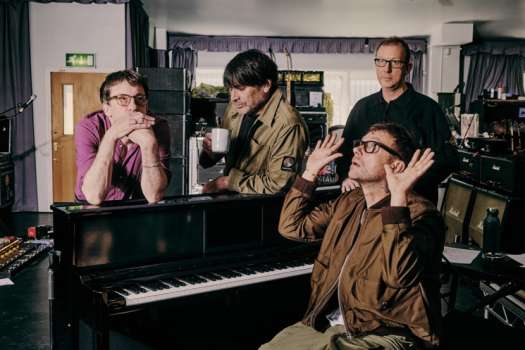Downtown Guelph resembles a ghost town in training on Sunday evenings, Devil's Night or no. On this particular Sunday that stagnant peace was disrupted by the several hundreds of dark-clad metal fans moving to and from, inside and out of, the crowded Concert Theatre. For an hour, maybe two, a long lineup of concertgoers snaked its way down the winding sidewalk and around a corner, many failing to get inside before the first band started to play.
The opening minute or so of Katatonia's set could have passed for a sound check -- no stage lights and no sound but drums. However, the situation improved before the first song was over, leaving the band with close to an hour to serenade the room. The cheerful Swedes spent most of their time wooing the crowd with the brooding gloom of their latest two records. The bass-heavy mix emphasized the lower-end groove of their newer material, accented and offset by a steady ebb and swell of dark atmospheric melodies. Thanks perhaps to their non-stop touring schedule, every track sounded animated, professional and tight.
For older fans, the highlight of Katatonia's performance had to be the final two songs excavated (somewhat jarringly) from the group's first two albums, 1993's Dance of December Souls and 1997's Brave Murder Day, with frontman Jonas Renkse and guitarist Anders Nyström switching places for the climactic close.
Before Opeth stepped onto the stage in Katatonia's place, the steady movement forward packed the lower floor with uncomfortable density. Any space that offered some relief from the press of bodies was likely to provide little or no view of the stage, combined with the distraction of people more interested in cheap beer and inane conversations than in the intricate subtleties of the band's performance.
Opeth's set was more progressive rock than metal, with not a growl to be heard. Their song choices emphasized the recently released Heritage, interspersed with older material that fit with the mellower overall tone -- a different take on "extreme," as spokesman/guitarist Mikael Åkerfeldt suggested.
The focus on details over aggression created its own kind of intensity and produced a vitality that hasn't always come across in Opeth's live delivery. Ignoring shouts for often-played classics like "Demon of the Fall" ("Does your ticket say we take requests?" Åkerfeldt asked), they made their way through a drum solo, acoustic numbers and several heavier tracks toward an encore without the awkwardness of the dramatic exit and re-entrance.
Song after song, Opeth demonstrated their "extreme" skill and inspiration, but with a more appreciative audience, the night would have been much more inspiring still.
The opening minute or so of Katatonia's set could have passed for a sound check -- no stage lights and no sound but drums. However, the situation improved before the first song was over, leaving the band with close to an hour to serenade the room. The cheerful Swedes spent most of their time wooing the crowd with the brooding gloom of their latest two records. The bass-heavy mix emphasized the lower-end groove of their newer material, accented and offset by a steady ebb and swell of dark atmospheric melodies. Thanks perhaps to their non-stop touring schedule, every track sounded animated, professional and tight.
For older fans, the highlight of Katatonia's performance had to be the final two songs excavated (somewhat jarringly) from the group's first two albums, 1993's Dance of December Souls and 1997's Brave Murder Day, with frontman Jonas Renkse and guitarist Anders Nyström switching places for the climactic close.
Before Opeth stepped onto the stage in Katatonia's place, the steady movement forward packed the lower floor with uncomfortable density. Any space that offered some relief from the press of bodies was likely to provide little or no view of the stage, combined with the distraction of people more interested in cheap beer and inane conversations than in the intricate subtleties of the band's performance.
Opeth's set was more progressive rock than metal, with not a growl to be heard. Their song choices emphasized the recently released Heritage, interspersed with older material that fit with the mellower overall tone -- a different take on "extreme," as spokesman/guitarist Mikael Åkerfeldt suggested.
The focus on details over aggression created its own kind of intensity and produced a vitality that hasn't always come across in Opeth's live delivery. Ignoring shouts for often-played classics like "Demon of the Fall" ("Does your ticket say we take requests?" Åkerfeldt asked), they made their way through a drum solo, acoustic numbers and several heavier tracks toward an encore without the awkwardness of the dramatic exit and re-entrance.
Song after song, Opeth demonstrated their "extreme" skill and inspiration, but with a more appreciative audience, the night would have been much more inspiring still.




